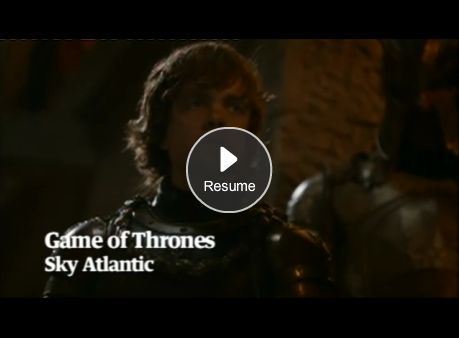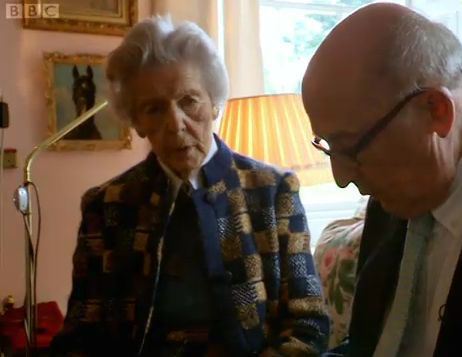Andrew Collins's Blog, page 37
June 6, 2012
Long to rain over us
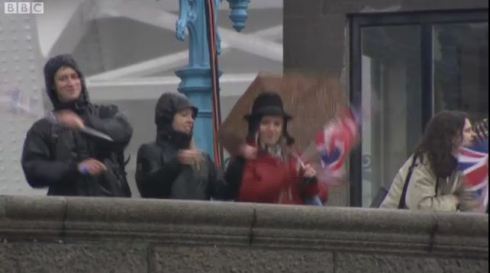
Well, thank God that’s all over: the longest Bank Holiday of my life. The Queen’s Diamond Jubilee turned out to be a good weekend for publicans, but much less so for republicans. At times during the dampened pageantry, feudal circumstance and flag-waving fever I genuinely felt quite alone. Out of step. Locked out of the love-in. It was an odd feeling. I had no interest in last year’s Royal Wedding, but it only lasted a day and was easily avoided. This loop of God Save The Queen and hip-hip-hoorays ran from Saturday to Tuesday, each day festooned with itinerary highlights and spectacles to ring round in the commemorative Radio Times. Street parties, flypasts, parades, concerts, bonfires, unpaid stewards, rosy-cheeked children, face-painted adults, those plastic Union Jack hats with elastic under the chin, Union Jack bunting unfurled, Union Jack cava uncorked … I saw a woman walking down our street with two flags attached to either side of her head, as if she was a car during the World Cup. I wished the neighbours good weather for their street jamboree – kitchen tables in the road, official roadblock, cars cleared – although I’m afraid they didn’t get it.
I don’t seek outsider status. I never felt that much like a rebel, or an outcast, growing up. Even when I had uncompromising hair in the mid-80s. Voting for Neil Kinnock in 1987 and 1992 felt nominally out of sync with the consensus – an act of rebellion in its own, NME-sponsored way. My views on certain issues have become rather entrenched and extreme in the past ten years, I admit, but we won’t go there. Politically, I was disenfranchised by New Labour and the Iraq war and it felt at the time like a pretty permanent situation. I had no idea just how repulsive a subsequent Tory government might be. But I’m hardly alone in this assessment. If the Spectator is going after Cameron and Osborne, it’s hardly storming the barricades to decry them as remote, self-serving, silver-spoon-fed buffoons.
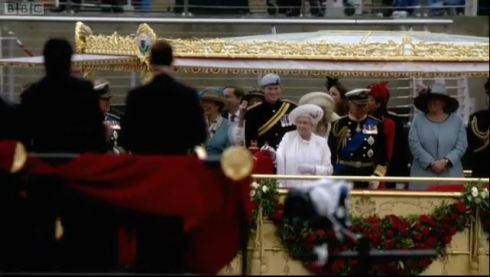
But the Jubilee? I have been seriously overwhelmed by the apparently universal waves of approbation for the Queen. It’s as if the nation has been drugged and somehow I find myself mysteriously immune. A million people, “subjects”, subjecting themselves to the humiliation and inconvenience of attending a public event in London at a time of heightened security and threatened rain, with no guarantee that they’ll actually see the Queen? I did my level best to avoid the TV coverage, but saw the worst of it on Channel 4 News, which maintained a certain distance, but nonetheless covered all aspects of the festivities. It would be idiotic to deny that hundreds of thousands of people – and not all of them with the commonsense waiver of tourism – had a fantastic time at the boat thing and the pop concert and the Waitrose garden party and what looked a protest march up the Mall but was actually an act of self-kettlement and had no complaint. All those people walking up a pedestrianised road to watch the Royal Family on a balcony on large video screens, erected by the Greater London Assembly and thus paid for by the cash-strapped citizens of the most expensive city in Britain. I did as London Transport advised me to and avoided Central London for four days.
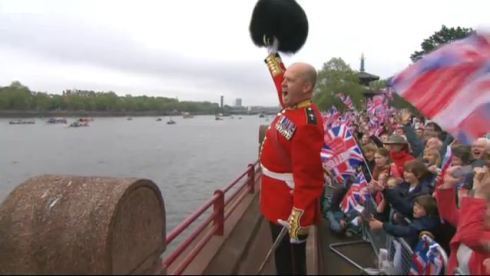
What got into people? I don’t mean to mock or to undermine, I merely ask the question. It’s clear that any shade of republicanism at a time of public holiday and extra drinking is unwelcome. I typed a few incendiary Tweets, but I did not take to the streets to wave a placard. I sincerely believe, as previously stated, that the Royal Family should be privatised for tourism, and that the 86-year-old Queen and the 91-year-old Duke should be allowed a peaceful retirement. Their eldest son, too. By all means call William a “King” but strip him of all constitutional powers (I heard someone on the news last night reminding us that the monarch has important political duties, to open Parliament and to choose Prime Ministers, but this is bollocks, she doesn’t, and shouldn’t anyway, have any democratic leverage) and let him generate tourist money for a PLC. If we replaced the Queen with an elected head of state, one who was re-elected every four or five years, I could live with that. This person might not be able to command a nation to wave OK!-sponsored flags and shout “Long live the Queen” from behind crash barriers to the news cameras, but it would stop this country looking like a museum exhibit. Even in the edited highlights, I grew weary of seeing grown men and women, but mostly men of course, dressed in garters and braid and wearing impractical headgear. Dressing up is fun, but these costumes smack of the Tudors, and The Tudors is a period drama on telly. How embarrassing that people still look like this on state occasions. I am a great fan of the state, but not on days like this.

Which brings me to my final moan. I am not a spoilsport. Ordinary people deserve a day off now and again. This is not about how much money it cost – although you can expect the pre-Jubilee estimates to spiral upwards as the true charges come in – but the simple equation at the heart of it: we, the people, saying “Thanks!” to a woman who had no choice but to take the job in 1952, for not jacking it in, or dying, in the meantime. At least other celebrities who have us gathered in large numbers, cheering and spending our money, give us a bit of themselves. We do not, and cannot, know this woman, or her family. She is, by definition and design, remote. Perhaps she should have our sympathy as well as our respect and admiration. Though her daily life is not enviable, she is considerably richer than even some of David Cameron’s old schoolmates. She likes horses and dogs, we know this much, but spends most of her life waving, travelling and dressing up, and not with her horses and dogs. It’s a waste of a life. And now her husband has caught an infection, which must have royally ruined her weekend, and all because he was made to stand in the rain and cold for four hours on a Saturday while some boats went past.
Meanwhile, the killing joke, unpaid “subjects” from Plymouth, Bath and Bristol who had slept under a bridge and had to change into their steward’s uniforms in the street, worse high-viz jackets so as to stop other “subjects” moving freely about public streets. Good on John Prescott for demanding an investigation in the company that hired them.
When I was an NME-reading idealist, I would have assumed that the musicians I admired would no more play for the Queen than to play Sun City. But on Sunday night, nearly all of them did, or so it seemed. Statues, in my utopian vision, were to be kicked over. Serfdom was a thing of the past. I was knocked back on Twitter for expressing my dismay that Madness would lend their talent and reputation to such an event as the Diamond Jubilee Concert, but I can’t help it. I’ve just always had them down as occupiers of the left field rather than the establishment. What I have discovered is that the battle lines have been moved. It’s now fine to support the monarchy (and by extension our attachment to the long-gone Empire and all its ceremonial trappings and honours), but still be a bit left wing. I mean, we expect those who’ve accepted a knighthood – Cliff, Elton, Macca, Tom – to bow and scrape before the monarch who tapped them on the shoulder with a sword (does she actually do that?), and even excuse the likes of Robbie and Gary, who must be angling for similar royal appointment in the future, but where do Madness fit in? Sir Suggs? Sir Woody? Sir Chas? What about Ed Sheeran? Is he, too, a royalist? (He’s 21, so perhaps he has yet to formulate any political opinions?) As for the comedians, of whom I definitely ask too much, I guess they’re in the noble tradition of Billy Connolly, Spike Milligan and Ben Elton in cosying up to the Royals, and that doing the Jubilee Concert is no worse than doing the Royal Variety Show. But I expect my satirists to stay outside the tent so that they can urinate in, and find the acceptance of orders of the British Empire antagonistic to this important position. Should I stop worrying about all this?
At one end of the scale there’s Melanie Philips in the Mail – a paper whose post-flotilla coverage even outstripped the Telegraph‘s 17 unbroken pages – claiming a tear in the eye and a lump in the throat at the flag-waving multitude on the banks of the Thames; at the other end there’s Owen Jones, a young man prepared to nail his colours to the mast and declare himself a republican on telly. I’m at the Jones end of the spectrum, but it’s lonely out here.

June 2, 2012
Not Ripley, believe it or not

Overbearing hype? Protracted fanfare? Viral marketing campaign? Self-defeating build-up? Adverts for adverts? What a waste of money. They had me at “Prometheus.” Prometheus! It’s only Ridley Scott’s bloody prequel to Alien! 20th Century Fox (a News Corporation company) could have saved millions of dollars and just chucked it out without even bothering to design a poster. Surely cinema traffic would have been identical.
I was almost literally first in the queue for the first showing at 12.40 yesterday. The 3D glasses seemed new, which is a bonus, as they’re so often smeared with popcorn grease which cannot be removed, even with the wiping skills of Lady Macbeth. I hate 3D. Have I mentioned this? Because Prometheus is an “event picture”, and I was genuinely excited about seeing it, I convinced myself that seeing it in 3D would add to the “event.”
It sort of did, at the very beginning. But as soon as we were looking at people talking to other people, which happens a lot in films, even blockbusters, the 3D became an irritant. I don’t wear glasses, so even having them on feels awkward. And the only 3D films I’ve seen that work are computer animations. Live action in 3D is pointless. My guess is that the amazing visuals in Prometheus – the planet scenes, the CGI alien spaceship, the Alien-echoing egg-type chambers etc. – would be amazing in 2D. I look forward to finding out on DVD.
If Prometheus had been as magnificent as I was willing it to be, I would have gone back to see it next week, in 2D somewhere. But I’m afraid it was a disappointment. I’d say three stars, which is not a disaster, but three stars is not enough for a film subject to that much hype and expectation. I won’t go into too much detail, as the less you know the better it will be (I turned over when the much-fanfared second, longer trailer was “premiered” in the middle of Homeland, for fear of finding out too much), but Michael Fassbender steals the show as android David. Imperious, subtle, clever, fluid, he’s by far the best character. The rest of the crew, cryogenically awoken at the beginning, Alien style, a bit crumpled and Anglo-American, Alien style, were really nicely cast – Rafe Spall, Benedict Wong, Sean Harris, Idris Elba (playing an American just about) – but as with any supporting character in this type of story, they are mere pawns in a game of “Who gets killed next?”
There are moments, and entire sequences, in Prometheus, that feel like they are in the prequel to Alien, which should be a lovely big gift to fans of the franchise. (One with Noomi Rapace that I will not even hint at, is a tour de force on every single level.) But, like Danny Boyle’s Sunshine, which was Alien inspired, it starts much better than it ends. That’s why I can’t go into any more detail.
It’s a good sci-fi horror thriller. It rewards a working knowledge of Alien. It sticks to what Alien does best. And, of course, Ridley Scott can direct. He invented many of the moves in Alien, which have been copied and copied and copied ever since, so when he has another bash at them, he is Prometheus! It’s also possible that the bloody 3D spoiled my experience, but I’m confident enough in my critical juices to know that the promise at the outset is not paid off in the death. I wanted more. Not more action, not more gore, not more panoramic spectacle, but more … words. More story. More depth.
I’d be really interested to know what others think, so let me know. (I only switched over by accident but they seemed to be in the process of giving it a right kicking on Newsnight Review last night – I think Peter Bradshaw in the Guardian came closest, from the reviews I’ve read.)
On a lighter note, the man after me in the queue at the cinema asked to buy a ticket for Promiscuous. I wonder if that was in 3D?

June 1, 2012
After Henry V
The new Telly Addict is available in the usual place, but in a new shirt (thanks). As an antidote to the Jubilee glut on television, I offer you: The Bafta Television Awards on BBC1; Panorama: Stadiums Of Hate on BBC1; How To Be England Manager on BBC3; Game Of Thrones on Sky Atlantic; and Hit & Miss on Sky Atlantic. (Sorry about the double dose of Sky Atlantic if you haven’t got Sky, but the former is really only a clip, featuring the great Peter Dinklage having his Henry V moment.) Send her victorious etc.

May 30, 2012
Game of throne
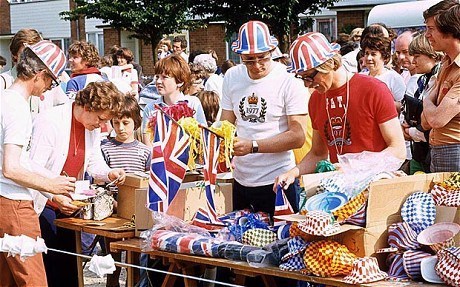
Hey, I celebrated the Queen’s Silver Jubilee along with everybody else in 1977. I was 12 and not yet a republican. The country had three TV channels and most cinemas had one screen. We didn’t have a street party in Winsford Way, because it was a through road, but there was a modest crisps-and-jelly affair for the kids in Jean and Geoff’s back garden, which I seem to remember appreciating, despite being the oldest there and approaching the quagmire of teenage. Mum bought us Jubilee-themed t-shirts – white with a Union Jack “J” on them, I think – and we wore them without protest and certainly without irony. My brother and I rode our bikes round the estate to see which houses had decorations outside. It was quite a few.
I must have been dimly aware of the Sex Pistols’ God Save The Queen but if so, it is not mentioned in my diary, only the fireworks on telly and the day off school and the lighting of the beacons, also on telly. Perhaps news really did travel more slowly to the provinces in those days. Punk certainly didn’t enter my life until 1979.
As a fully grown adult in 2002, I had to sit through the Queen’s Golden Jubilee as a card-carrying armchair anti-monarchist; by this time I had long come to regard the Monarchy as an outmoded, offensive and defunct proposition. The very idea of a bloodline denoting an income based upon tax and a caste system that actually categorises the majority as “subjects” is surely a relic from another century, and not even the 20th.
We may not be able to stop landowners handing down their wealth to their heirs (well, we could tax them harder like the postwar government did, but unless we’re going to stage an actual revolution – in this heat? – the rich won’t be stripped of their assets any time soon), but we can surely take the Royals off the civil list. No? Even at cut price and by selling off their yacht and putting a gift shop in Buckingham Palace, they still cost the state £32.1 million a year in grants and direct subsidy, and the fawning celebrations for this latest Jubilee are not going to come cheap. Not with all those boats! (Although it’s delightful to know that tourists will have to pay to enter certain public thoroughfares at the weekend. Glad you came?) Actually, in the fine tradition of public events, it’s being mostly funded by private money, but the taxpayer is stumping up for the not-inconsiderable security bill.
The Queen herself has a personal fortune of £310 million, mainly from property, so she doesn’t need to work again. She’s old; let her retire. So is her heir; let him retire too – he’s got plenty of retirementy things to be getting on with. If we’re going to keep this eccentric family as living waxworks for tourism, which is an option, then cut them loose, turn them into a private corporation and let them manage their own finances without state handouts. If they want jobs where they don’t have to pay tax, then they should become the head of the IMF. (Surely the Tories would stand up and cheer the notion of privatising them?)
I think what I’m really against this weekend is not the Queen asking us to celebrate her not-insignificant 60 years on the throne, but the four-day weekend itself. Two bank holidays? Really? (And this was originally a New Labour initiative, I believe.) And there was I thinking the economy was in peril. I’ve just received my weekly email from Transport For London and it basically tells me not to bother going into Central London between Friday and Tuesday. Similar advice will be sent out for the Olympics and the Paralympics, a grotesque carnival of corporate self-interest and cross-promotion whose admirable sporting achievements will struggle to be seen and heard above the din of product placement. (Cheery cartoon posters on the trains warn those of us who live here and whose council tax paid for the Olympics to avoid certain key stations, change our journeys, work from home and generally get ready to have our working lives disrupted for the best part of a month. Other posters ask us to volunteer to clean the streets of London for nothing, and entice us to do so by jokily telling us that it’s like when your Mum comes round your flat except your flat in London and your Mum is the “rest of the world”. This initiative is sponsored by Fabreze and other cleaning brands linked with huge multinational petrochemical corporations, which begs the question: why don’t they put their sponsorship money into paying people without jobs to clean up? I thought that’s what this recovery was all about?)
This is no summer to live in the capital. (And God help you if you are disabled; I saw a report on Channel 4 News which showed a wheelchair user getting on the Piccadilly line at Heathrow and being literally unable to get off the train for the whole line, having to travel all the way back to Heathrow to escape the London Underground. Still, they did rather spring the Olympics on us, didn’t they?)
I admit it: I dislike forced jollity. I’m all for fun, don’t get me wrong, but I like to decide when I’m going to have it. (I’m not much use on New Year’s Eve, either, but I am great at spontaneously getting the beers and rosé in and turning an afternoon into a long night without warning. And not always on my own!) I find it difficult to get worked up about things the Royals have achieved, as they have the biggest head start in Britain. When one of them found a girlfriend willing to sacrifice all vestiges of normality and privacy in return for marrying into his eccentric family a year ago, I was expected to be excited about that. I wasn’t.
If you’re interested, the Guardian did a very informative pictorial spread on the weekend’s festivities, with all the sailing ships and everything. It’s here. (It being a republican paper, it also shows you how much the Queen costs.) I’m planning on avoiding the whole thing by going to the cinema for four whole days (cool, dark, serves chilled beverages etc.). It will be good practice for the Olympics. If I may risk an athletics allusion, don’t get me started on the Olympics.
(Oh, I’m really looking forward to Euro 2012. I hope those far-right Ukrainians are excited that their Mum ie. the rest of the world, is coming round their flat.)

May 25, 2012
Look! A Mitford!
This week’s Telly Addict - in which you will see that I have eschewed the now-traditional jacket to reflect this glorious weather – contains no adult language whatsoever and no scenes that viewers may find disturbing unless a man fishing some soiled underpants out of a public toilet cistern at Chatsworth House falls under that heading. Despite the kind comment under last week’s complaining that the Guardian clearly doesn’t “train” its “journos” how to present TV properly (idiot: I’m not a Guardian “journo”!), I soldier on and amateurishly review Chatsworth on BBC1; Starlings on Sky1; and Silk on BBC1. Ideally, interested parties will discuss the shows under review. Alternatively, they can criticise my technique and question my professionalism, in the mistaken belief that watching Telly Addict is compulsory and not voluntary.

May 21, 2012
Save £££££££££££s!

I had a realisation yesterday, and it may be a sign of the times, but it hit me like a diamond bullet in the forehead all the same: I get much more of a kick out of saving money than I do from spending money. I made the vanilla and almond biscotti that I have very badly photographed above, and, on carving out around 48 biscuits from one baking tray and popping them into Tupperware tubs, I decided to calculate exactly how much they cost to make. (It was fun to cook them, by the way, and took just over an hour.)
In a possibly over-forensic manner, I worked out how much I’d spent on flour, sugar, eggs, butter etc. (this is easy to do if you know the price of the food you buy), and the grand total, discounting the electricity I’d used to bake the biscotti for a total of 40 minutes, was £3.88. Now, I could have reduced this total sharply by not using organic eggs, organic almonds, organic butter and – added ingredient! – about eight squares of Green & Black’s chocolate. (I had to buy the flour round the corner, having spontaneously decided to make the biscotti, and they only had non-organic.) Although I saved on vanilla pods by using a drop of essence, I used flaked almonds instead of whole, as I had some in the cupboard; next time, it would be much cheaper to smash up whole almonds bought in big bags. In other words, I reckon it could be done for closer to £2. Even at my organic price, that’s about 8p a biscuit, but at £2 it would be more like 4p. I sometimes treat myself (those words) to a shop-bought box of biscotti and they cost £2.19 for about 20 biscuits – the rest is packaging – which is almost 11p a biscuit. Over 40 biscuits, that’s a saving of £1.20, which would rocket to £2.80 if you spent less on the ingredients, as I will do next time. If you buy a single biscotti in a high street coffee shop, it’s 99p. You don’t need to do the maths (which is lucky, as I am shit at maths). The maths does itself.
In yesterday’s Observer, the ever-reliable David Mitchell was writing about Michael Gove, chiefly, but had this enlightening thing to say about saving money.
In my life, the money I would otherwise spend on shampoo is very dear to me: I buy the cheapest possible shampoo. When I can steal it from hotels, I do. I use every last squirt from every bottle, eking out days’ more use from each one when most people would have thrown it away. I dote on the thought of that saved money. It may amount to as much as £14 over my lifetime. Meanwhile, the money I waste because I’m perpetually on the wrong mobile phone tariff is sent out into the world neglected and unloved.
Now, Mitchell is a well-recompensed TV personality and broadsheet columnist; he has less need to scrimp and save and worry about money than most. But unless you’re actually in the 1%, we really are all in this recession – or these recessions – together, and if Mitchell instinctively squeezes shampoo bottles, so should we all. And if we’re not squeezing them, we should ask ourselves why not. It may be the vilified “bankers” who got us into this mess – or more rightly, the governments that let them get us into it, or even more rightly, the free market that so dazzled the governments in the first place that they turned two blind eyes to the deregulated sleight-of-greed that was going on in their name – but we were happy to spend, on credit, when the going was good, and it’s up to us, I think, to put the brakes on and adjust to the new world order.



In the past couple of weeks, as you can see, I have made beetroot soup, a banana cake, and a radish and mint soup (which tastes a lot nicer than it looks). My imperative for doing this has been to use up what we’ve got. My fruit and vegetables are delivered, in a box, and that means you don’t know exactly what you’re going to get. One week, you might get 700g of beetroots, which is exactly the amount required for Delia’s beetroot soup recipe, which is free online [see: Factsheet at bottom]. Rather than see the beetroots going wrinkly and unloved in a drawer, I used them, and it serves four, which means it serves me, four times, over four days. The banana cake was, like the biscotti, a cunning method of giving myself a sweet treat in my packed lunch which obviates the need for me to buy expensive cakes and biscuits in coffee shops, or the overpriced British Library café.
I used to work in a rented office, but that had to go come the crash of 2008, when all but the most affluent belts were tightened. I have been working in the Library ever since, as it’s free once you have a Reader’s Pass. But in those early days, I used to buy my lunch, and a mid-morning snack, and even sometimes breakfast, in the cafeteria or café. Even though I was cutting back on expenditure by letting the office go, and cancelling my gym membership, and picking up my newspaper rather than having it delivered, it’s amazing how much I found myself spending per day on food. So the packed lunch became my creed. I cook up something meaty and long-lasting on a Sunday, and apportion it out Monday to Friday. I add to that something sweet, and maybe a Tupperware tub of plain yoghurt with dried fruit or stewed apple in it. Lovely! Although, yes, some days I wish I didn’t have quite so much in my bag, I always relish getting it all out for my lunch. (And to sneak out a couple of biscuits, especially homemade ones, in a coffee shop, feels like a moral victory.)
I have, it seems, turned into a 1950s austerity housewife. And that suits me fine. It takes time to make your own food, but as long as you enjoy cooking, as I do, it’s a surefire way of de-leveraging. We are all feeling the pinch to varying degrees, but it feels good not to throw your money away, doesn’t it? Capitalism requires us all to feel constantly dissatisfied, and to want to own more goods, and better goods. I have had my car for 11 years. By now, according to capitalism, I should have replaced it, or, at the very least, started to envy the better, newer cars of those around me. I don’t. I just don’t. (I am lucky enough to live in London, with its excellent public transport links, so I really don’t use the car much. I feel sorry for those who don’t have that luxury and can’t get about without a car.) I remember reading Will Hutton’s excellent The World We’re In a few years ago and being struck by the observation that the middle classes are the engine of free market capitalism, as, according to the rules, they own some stuff, and it’s the people who own some stuff who are in a constant state of anxiety about their stuff not being enough, or good enough, so they thrive to work harder and earn more money, so they can spend it, and thus, they motor the economy. This, one assumes, is why right-wing politicians are keen to convince us that we’re all middle class now. If we are, then we are the suckers.
This is a horrible period to be living through. I am personally not on my knees, but that’s mainly because I’m self-employed and cannot lose all my clients overnight in the same way that someone who is employed can lose their job overnight. Even in the media, budgets are being cut everywhere, and the BBC, one of my main employers, is public sector. And we all know how much love the Tories have for the public sector. It’s hard to imagine that, a few years ago, I had a gym membership. That seems so wasteful now. (Walking, I have discovered, is free.) Surely it’s better to bake your own biscuits than to buy them?
Oh, and my biscuits taste better. They’re not as sweet as the Arden & Amici ones, but the money I’ve saved is sweet enough.
Factsheet: the recipes mentioned are here, although I have customised them freely, as I often do, to accommodate what’s in the cupboard and fridge, which is a frugal way of doing it.
The almond and vanilla biscotti came from a Waitrose recipe. I used plain four instead of self-raising, so added bicarb and baking powder. I also added choc chips. The beetroot soup, Polish apparently, is a Delia recipe; again, adapted – I added red chilli for kick, and have tried both bacon for the stock, and the giblets from a chicken. The radish and mint soup was Hugh Fearnley-Whittingstall’s, although it’s designed to be eaten cold and I warmed mine up and used yoghurt instead of creme fraiche, and paprika for cayenne pepper (again, through necessity), which may have changed it for the worse. The beautiful banana cake – which lasted me for a week and a half, rationed to one slice a day – is by Dan Lepard, from the Guardian magazine. (I must admit, I was so exited by the outcome, I sent him the photo on Twitter, and he replied and everything.)
Incidentally, my food photography is rubbish because I don’t have a mobile phone with a camera, and instead use the rudimentary and awkward PhotoBooth application on my laptop. I don’t have a posh phone for the same reasons that I don’t belong to a gym or pay 99p for a biscotti in a coffee shop.

May 18, 2012
Up
Hey, at last, the new Telly Addict, which took its time going up today, don’t know why. In it, we will be told what to think about Phil Spencer: Secret Agent on C4; nearly the end of The Bridge on BBC4; 56 Up on ITV1; Episodes on BBC2; and, less pressingly you might think, Dad’s Army on BBC2 (which is, to be fair, a repeat from 1970, but you have to see this clip, you really do). Have a look. Comment. Etc.

May 16, 2012
We like it when our friends become successful
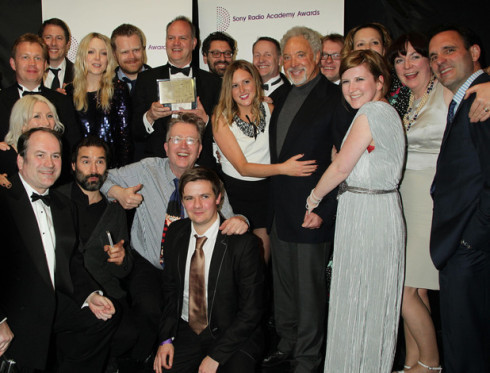
On Monday night, 6 Music won UK National Station Of The Year at the Sony Radio Awards. None of your rubbish, and about time, too. We’d sort of half-expected a nomination in the immediate wake of our pardon from execution in 2011, but we were overlooked in the heat of that particular moment and understandably half-wondered if we’d ever win. (If not then, when?) I say “we”, even though I have not been a permanent presenter on the network since 2007, as I am still made to feel part of the family by the nice people pictured above, and anyway, I have my own pigeonhole! I was there at the Sonys nine years ago, at the Grosvenor House Hotel, when the first Digital Terrestrial Station Of The Year award was handed out and we lost to Saga. (Not knocking Saga, but we felt robbed.) I was also there in 2010, too, when Jarvis won the Rising Star award for the station, and Adam and Joe won the Comedy award. It was fantastic to be able to bask in reflected glory around the 6 Music table, as I am now a friend of the station, a presenter and a fan. I wished I could have been there on Monday to drink in the crowning glory of ten years on the air.

Thanks to Christine Shanks for this photo of Jim Bob, playing some tunes on his acoustic guitar, having read from his new novel Driving Jarvis Ham at its launch in the rather less glitzy surroundings of Bookseller Crow, a gloriously independent bookshop in Crystal Palace in South East London last Thursday. This was not a case of reflected glory, as it was Jim’s night, and the book – if anything even better than his first novel, Storage Stories, but wrought in a similarly dark-whimsical style with Kurt Vonnegut-channelling illustrations – is his achievement. I was there to pay homage.
Jim and I go way back to the old Carter days, and I consider myself a delicate hybrid of fan and friend; I have certainly made it my business to promote his good works ever since in whatever modest way that I can (when his School album came out in 2006, I was able to get him and his guitar onto Radio 2 when, preposterously, I was asked to fill in for Mark Radcliffe and was allowed to choose my guest; I also think I might have made the introductions that put him inside Robin Ince’s pluralist circle of trust, which led to his glorious, 23-piece-orchestra rendition of Angelstrike! at Nine Lessons and Carols in 2009, and his subsequent casting in White and Ward’s Gutted musical at Edinburgh).
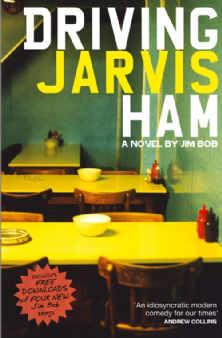
So it is that Jim flatters me by caring what I think and asking me to read his books before they are published, and I flatter him back by supplying a quote (luckily, I have liked them all so far!), and then he flatters me back by printing my quotes in his press releases. For Jarvis Ham, he and his publisher have made me especially proud by putting one of my quotes on the front cover. And it’s a hardback! I wouldn’t have missed the launch for the world. It’s slightly odd when you are a friend and a fan, I concede. But I’ve been standing and watching him play, or speak, for years, and you get used to tapping a toe and joining in the warm applause – and, in the case of that gig at the Bull & Gate in September 2010, shouting out stupid drunken things like some prick of a heckler – and that’s what happened on Thursday. It was a happy occasion. I don’t get out much in the evenings, but you make exceptions when it’s important.
Last night, Michael Legge and I had our second date in less than a week when we attended What Is Love Anyway? at the Bloomsbury Theatre in London. (He’d be at Jim’s launch, too. He is also a friend-fan.) This is the latest one-man show of another of my friends who is successful. I have seen every show Richard Herring has done since 2001, when, in Edinburgh, I saw Christ On A Bike: The First Coming. As I used to like to point out when he and I spoke more often than we do now, I paid to go and see that show twice, as I also saw it when it transferred to London. In the ensuing years, I stopped paying as he and I developed a friendship via 6 Music and Banter, and I guess it’s ironic that by the time of The Second Coming at Edinburgh in 2010, I was his comedy partner. As such I was a combination of friend and fan and partner, which is a heavy load to bear, I can tell you. The “partner” part sometimes enhanced the “friend” part and at other times seemed to destroy it, but even in our darkest days, I remained a fan.

This was the penultimate performance of What Is Love Anyway?, and this means I was seeing it at its most honed and perfected. I’m glad I waited, as I’m pretty certain this is his crowning achievement thus far. Of all ten of his shows that I have seen (many of them twice), this is the most mature, and the most ambitious, and most moving. It flows beautifully from one passage to the next, and the climax involving his grandmother, Alzheimer’s and glitter is one of the most expertly constructed of his long career.
I was proud to know him. It actually seems preposterous that he and I once stood and sat on the same stage at the Bloomsbury and entertained a similar audience. But we did. Of course, of the two of us, Richard is the one who’s still doing it, and improving, and honing, and perfecting. It’s his gig. Not mine. I had blagged some comp tickets last night, but aside from that luxury – a luxury based on a friendship that may have become a little more formal but survives as such – I was there as a fan.
It would seem churlish to hate it when your friends become successful. After all, you would hope they would share in your success. 6 Music is now so successful, its own presenters get into fights when they are nominated for the same awards, where once they weren’t nominated at all. Jim Bob is carving out a second career as a novelist – I met his literary agent and everything! – which he is able to blend with his career as a musician. Like Jim, Richard has to work hard for his money, and perform constantly, but he is building upon his existing career and he still spends way too much of his time in cheap hotels or driving on motorways at night, but he is also settling down, too, which is nice to see, as a friend.
(Funnily enough, I’ve just realised that I am a friend and fan of Michael’s too, which seems to be working out. But I would like to stress that most of my friends are just friends, very few of them work in the media or showbusiness, and thus none of us are fans of each other’s, we are just friends.)

May 14, 2012
Breaking up is never easy I know
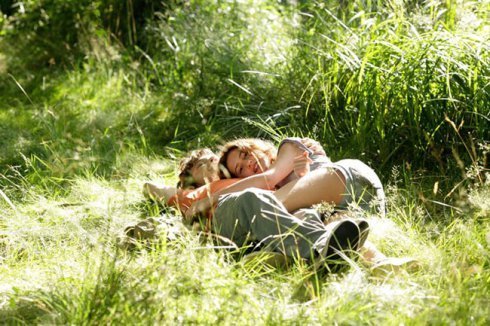
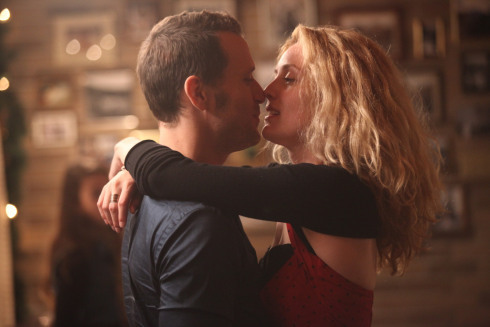
Here’s another interesting, random connection between two films seen close to each other: Café de Flore is a French-Canadian film, mostly in French, and Goodbye First Love is a French film, completely in French, and they share a fascination with love that is impossible to give up. The big difference being: one works, the other only partially.
I was filled with trepidation about Goodbye First Love, as writer-director Mia Hansen-Løve’s previous film, her second, Father Of My Children, rubbed me up the wrong way, despite glowing reviews and a laurel of some kind at Cannes. Actually, they’re French films, let’s give them their native titles: Le père de mes enfants; Un amour de jeunesse. Now, those with schoolboy French will have spotted that, while Father Of My Children is a literal translation of Le père de mes enfants, Un amour de jeunesse comes out as something like A Love Of Youth, or A Love Of The Young; Young Love, I guess. Even First Love. But the Goodbye part seems to be peculiar to the official English title. It gives a little more away, as this is a film about the first meaningful relationship of a Parisian girl, Camille (Lola Créton), aged 15 when we first meet her, and her tousle-haired boyfriend Sullivan (Sebastian Urzendowsky), who doesn’t just have a roving eye for the ladies, but a roving eye for the map. Here’s the goodbye part – and it’s given away in the trailer, which, again, I think I’ve seen about 50 times at various Curzon cinemas , where it’s an understandable shoo-in – Sullivan goes travelling in South America and ends the relationship. Typical boy.
There they are, in the top picture, young and in love and mistaken in the belief that their love will last forever. Hey, we’ve all been there. Hansen-Løve, who apparently based the story on her own experiences, captures the guileless optimism of this life-stage with a lightness of touch, and eliciting believable performances from her two leads; the way Camille puts up with Sullivan’s evident failure to live up to her many-splendoured plans for their relationship, and the way, in turn, that her needy demands on his heart and silly threats about not being able to live without him actually start to drive him away. When he hops it, she puts up a map of South America, and they exchange letters, but these letters dry up, and eventually, she tears the map down.
There’s nothing startlingly original in making a drama about saying goodbye to first love, and going over such adolescent ground could have spelled Twilight without the vampires as Camille moons about, her cheeks permanently moist with huffy, heartbroken tears (“When will you get over him?” asks her mum), but in playing the story out over a number of years and haircuts, Hansen-Løve shows how durable that first bond can be, and even when Camille has signed up to an architecture course and found a new distraction in her middle-aged tutor (a louche Norwegian, played by Magne-Håvard Brekke), the flame for Sullivan still burns.
I won’t roll out any more of the plot, other than to say it’s confidently and carefully seen through, consistently engaging and even occasionally surprising, so any trepidation about Hansen-Løve based upon my disappointment with Le père de mes enfants was misplaced. Maybe I just didn’t buy the trajectory of that one – which I won’t spoil – even though I’ve since read that it, too, was autobiographical and actually happened! I do have a massive soft spot for French films – just seeing the bread on the table and the red wine in glass tumblers, and recognising that all-pervasive air of bohemian ease, never mind the aesthetically pleasing rhythms of the language – but I’m not blind to individual faults. Elles, for instance, was awful, and its Frenchness did not save it. Goodbye First Love is superb.
Café de Flore isn’t. Having read a one-star assassination by not Peter Bradshaw but one of his lieutenants in the Guardian, and passed a five-star rave by the redoubtable Alan Jones for the online database of my very own Radio Times, I went into the cinema with one eye wide open and the other wide shut. Would it be a “narcissistic and fundamentally unpersuasive mosaic” with “the most stupid movie twist of the decade”? Or a “bold … uncompromising, passionate … intoxicating triumph that bristles with sly innovation”?
Well, it was a bit of both. From French-Canadian director Jean-Marc Vallée, who, oddly, made serviceable heritage drama The Young Victoria, this is a striking collage of imagery built from fragments that represent not just actual memories but sometimes imagined ones. It cuts together two parallel stories: one about the domestic mid-life hari-kiri committed by a crashingly unsympathetic 40-year-old superstar DJ, Antoine (Kevin Parent), who, when he’s not at home in Montreal is out tickling clubs full of ravers with his supreme deckmanship, and when he’s not doing that, he’s leaving his angelic and lovely wife Carole (Hélène Florent) for a younger “bimbo”, which leaves him socially exiled by his parents and daughters; the other about a poor young single mum (Vanessa Paradis) in late-60s Paris who raises her Down’s Syndrome son Laurent (an amazing Marin Gerrier) with so much love it threatens to engulf them all.
Like Goodbye First Love, Café de Flore effectively depicts that unquestioning brand of love, the kind that can drive you mad. You can trace parallels between the lovey-dovey passion of Camille and Sullivan, and the similarly pubescent devotion of Antoine and Carole as young teenage Goths listening to The Cure’s Faith album, and making vows in eyeliner. In both films, we see that intoxicating brand of first love develop, although in the latter case, the pair get married, have kids and then split up. She even clingingly forgives him for straying with the blonde “bimbo” (as she’s called constantly by the eldest daughter), but he won’t go back as for him, the love is gone. It’s not as if his wife is old and worn out, or that his bimbo is particularly stunning and nubile, but it’s enough to cause this preening ninny of a man to make a bonfire of his marriage.
Throughout the film, and this is where it gets infuriating, we are teased with possible connections between the present and the past. When, in the final act, we are offered something concrete, it is in fact balsa wood, and although the final twist isn’t “the most stupid of the decade” (we are only two years into the decade), it’s not enough to hang a two-hour film on. And certainly not when that film seems to revel so arrogantly and confidently in the cosmic clues that are constantly dropped. Vallée seems to want us to keep asking, “How are these two stories linked?”, and we do, because he jumps from one to the other throughout, but if you demand an audience asks questions, you have to answer them in a meaningful way. (For instance: the coincidental party of adults with Down’s Syndrome who come through an airport arrivals hall in the present when Antoine is leaving for a foreign gig – he disappears into a blur; they emerge from a blur and come into focus – it’s an arresting image, but playing with the focus and putting it in slo-mo does not fool anyone; it’s actually a pretty manipulative coincidence. It’s never explained. But it’s hardly subtle enough to be called a visual rhyme, or an allusion.)
Goodbye First Love got better while I watched Café de Flore. Hansen-Løve sees no need to muck about and tantalise; she just tells her story, in order, and we’re with her. Vallée is clearly of a more experimental mindset and while his ambition can be applauded – and, to be fair, some of the fragments do pay off, like the vapour trail in the sky, and the sheer audacity of using a modern piece of dance music to link contemporary Montreal with 1960s Paris takes some front – but it veers towards pretense too often. And it’s way too forgiving towards Antoine’s infidelity. Typical man.

May 11, 2012
Middle of the road
Telly Addict is up, with the finale of Homeland on C4; Britain Beware (with added Tufty) on ITV1 and Planet Earth Live on BBC1. Be careful out there. Don’t be like Willy.

Andrew Collins's Blog
- Andrew Collins's profile
- 8 followers


